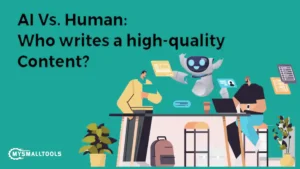Who Writes a High Quality Content?
Content is essential for every online platform. Whether you manage a Facebook profile, have a website, or engage in various marketing efforts, producing content is crucial.
Currently, there are two primary approaches to content writing: manual writing by humans or automated generation using AI tools. Artificial intelligence has transformed the content creation process, yielding swift and effective results without manual effort or mistakes. However, a common question arises: can AI-generated content truly replace that created by humans?
This is a frequently posed inquiry among digital platform owners. If this question occurs to you and you ponder the quality of both types of content, you are in the right place. This article will delve into the discussion of AI versus human contribution: which produces superior content?

Time Investment
Producing high-quality content requires substantial effort and time to achieve a high standard with minimal errors. People typically take care to write content thoughtfully, ensuring it adheres to the intended message, avoids grammatical errors by utilizing dependable online grammar checkers, maintains originality, and has an engaging style. To fulfill these standards, individuals invest a significant amount of time to guarantee quality and precision.
Conversely, AI writers take considerably less time than their human counterparts. An AI content generation tool can produce large volumes of text in mere seconds. This efficiency is why many content creators are starting to prefer AI writing tools. Content that may take humans between two to three hours to compose can be generated almost instantaneously by generative AI.
Cost Effectiveness
AI tools are often available without any charge. The user simply inputs their prompts, and the free AI writer crafts high-quality content that fulfills all criteria. This is particularly beneficial for startups and entrepreneurs with limited budgets for hiring human writers. However, premium AI options also exist for those seeking enhanced efficiency and superior results. Paid tools may provide additional functionalities like increased word count, advanced algorithms, multilingual capabilities, and tone modifications.
Also Read
In contrast, hiring human writers can be costly. Companies and website owners must pay substantial fees to engage professional services. Additionally, the recruitment process—including candidate vetting and discussing project needs—requires significant time and financial resources.
In the end, employing human writers will typically be more expensive than using a free AI writer. Nevertheless, if you choose to generate content yourself by leveraging your creative abilities, you can avoid the costs associated with hiring and produce content at no charge.
Understanding Context
The context is vital for creating effectively written content. While AI can imitate human-like intelligence and produce outcomes based on input data, it still has limitations. One significant shortcoming is its contextual comprehension. AI text generators struggle to grasp the deeper meanings, contexts, and subtleties of the language provided.
In contrast, people are intricate beings exhibiting the highest degree of intellect. They do not limit themselves to the information provided or its literal interpretations. Instead, they engage in thoughtful writing, thoroughly exploring the subject and grasping the deeper meanings behind the words. They assess language from various angles and express themselves in varied ways. The ability to create diverse content represents a significant advantage of human output over that produced by AI.
Empathy
People are the ultimate bearers of emotions and feelings. They invest their inner thoughts and passions into their writing due to their emotional nature. For example, when tasked with composing a blog post about caring for pets, they weave in their affection, personal anecdotes, and emotional reflections.
While AI writers can be much quicker, produce factually accurate and grammatically correct text, and possess an extensive database, they lack the ability to feel as humans do. AI-generated text cannot convey emotions and remains devoid of sentiment. This limitation represents a notable disadvantage of AI-generated writing.
Bias and Personal Viewpoint
As previously mentioned, individuals create content rooted in their emotional experiences. They can apply their personal viewpoint to minimize biases. For instance, if a headline seems overly biased toward a certain subject, a human writer will embark on a journey to scrutinize it. They will dedicate time to revealing the truth and writing with impartiality, avoiding favoring any one aspect of the topic.
Nonetheless, it is essential for all writers, be they human or AI, to prioritize transparency and reduce bias. An AI writer operates without personal opinions or analytical capabilities. Instead, it relies on learned patterns to produce output. Consequently, if provided with neutral data, it will yield neutral outcomes, while biased information will lead to biased writing.
Conclusion
The impact of AI has permeated almost every area of the digital realm, particularly within the writing sector. Still, some users question the effectiveness of the results, pondering whether content is of higher quality when created by humans or AI.
However, the response is not straightforward and cannot be summarized in a single statement. The prior discussion highlighted the advantages and disadvantages of both approaches. Human writers excel in context comprehension and emotional resonance, while the efficiency and cost-effectiveness of free AI tools are unmatched. Therefore, we conclude that high-quality content can indeed be produced by leveraging AI writing tools.


